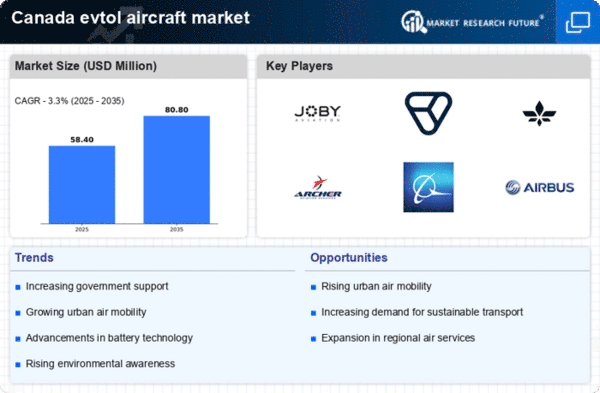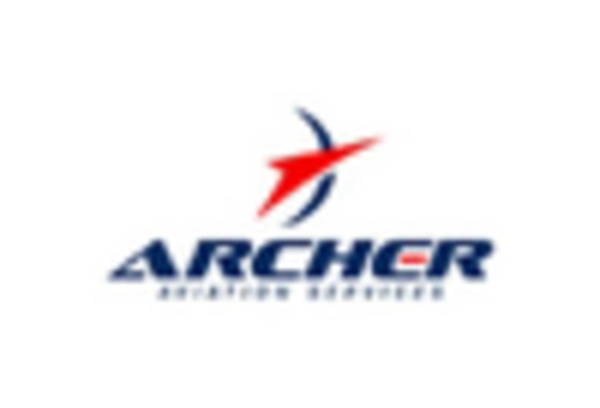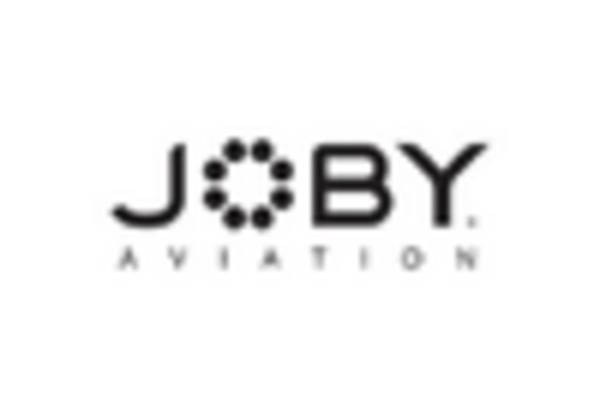Urban Air Mobility Demand
The eVTOL aircraft market in Canada is poised to benefit from the increasing demand for urban air mobility solutions. As urban populations grow, traditional ground transportation systems face congestion challenges. eVTOL aircraft offer a promising alternative, providing rapid transit options that can alleviate traffic woes. Cities like Toronto and Vancouver are exploring eVTOL solutions to enhance public transportation networks. The potential for eVTOL aircraft to operate in urban environments could lead to a market growth rate of approximately 15% annually over the next decade. This demand for efficient urban air mobility solutions is likely to drive innovation and investment in the eVTOL aircraft market.
Environmental Sustainability Goals
The eVTOL aircraft market in Canada is increasingly aligned with environmental sustainability goals. As climate change concerns grow, there is a pressing need for cleaner transportation solutions. eVTOL aircraft, which are designed to operate with electric propulsion systems, have the potential to significantly reduce greenhouse gas emissions compared to traditional aviation. The Canadian government has set ambitious targets to reduce emissions from the transportation sector, which may drive the adoption of eVTOL technology. This alignment with sustainability objectives could lead to a market expansion of approximately 20% by 2030, as both consumers and businesses seek greener alternatives in the eVTOL aircraft market.
Government Support and Funding Initiatives
The eVTOL aircraft market in Canada is likely to benefit from increased government support and funding initiatives aimed at fostering innovation in aviation technology. The Canadian government has recognized the potential of eVTOL aircraft to revolutionize transportation and is actively investing in research and development programs. Initiatives such as the Innovation Superclusters Initiative aim to create collaborative environments for technology development. Additionally, funding opportunities through agencies like Transport Canada may facilitate the testing and certification of eVTOL aircraft. This supportive regulatory environment could lead to accelerated growth in the eVTOL aircraft market, with projections indicating a potential market size of $2 billion by 2035.
Technological Advancements in eVTOL Design
The eVTOL aircraft market in Canada is experiencing a surge in technological advancements that enhance aircraft performance and safety. Innovations in battery technology, such as solid-state batteries, are expected to improve energy density and reduce charging times, which could lead to longer flight ranges and increased operational efficiency. Furthermore, advancements in autonomous flight systems are likely to enhance safety and reduce pilot workload. The integration of advanced materials, such as lightweight composites, is also anticipated to improve fuel efficiency and reduce operational costs. As these technologies mature, they may attract investment and foster growth within the eVTOL aircraft market, potentially leading to a projected market value of over $1 billion by 2030 in Canada.
Partnerships with Aerospace Industry Leaders
The eVTOL aircraft market in Canada is likely to see growth through strategic partnerships with established aerospace industry leaders. Collaborations between startups and major aerospace companies can facilitate knowledge transfer, access to advanced manufacturing techniques, and regulatory expertise. These partnerships may enhance the development of eVTOL aircraft, ensuring they meet safety and performance standards. Furthermore, established companies can provide the necessary funding and resources to accelerate the commercialization of eVTOL technologies. As these partnerships evolve, they could contribute to a more robust eVTOL aircraft market, with estimates suggesting a market value of $3 billion by 2040.
















